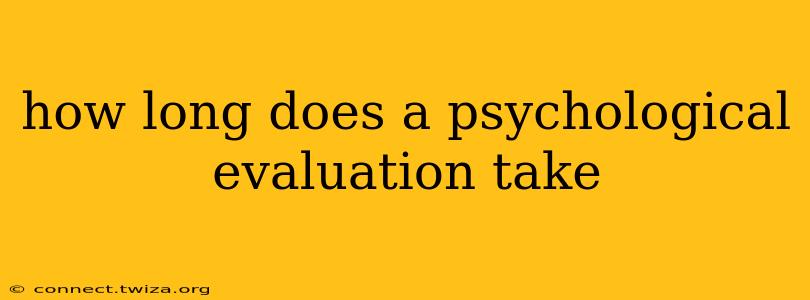How Long Does a Psychological Evaluation Take?
The length of a psychological evaluation varies significantly depending on several factors. There's no single answer, as the process is tailored to the individual's needs and the reason for the evaluation. This article will explore the factors influencing the duration and provide a clearer picture of what to expect.
What Factors Determine the Length of a Psychological Evaluation?
Several key factors contribute to the overall time commitment involved in a psychological evaluation:
-
Reason for the Evaluation: A brief evaluation for a driver's license renewal will be considerably shorter than a comprehensive evaluation for a disability claim or a complex legal case. A child's evaluation might also differ greatly from that of an adult.
-
Complexity of the Issues: Simple evaluations addressing straightforward concerns may only require one or two sessions. However, more complex cases involving multiple diagnoses or significant life stressors will necessitate longer, more in-depth assessments.
-
Type of Testing: Some evaluations rely primarily on interviews and clinical observations, while others incorporate extensive psychological testing. The number and types of tests administered significantly impact the duration. Neuropsychological testing, for example, can be quite extensive.
-
Client's Needs and Cooperation: A client's ability to engage fully in the process and provide accurate information is crucial. If a client experiences difficulty focusing or expressing themselves, the evaluation may require more time.
-
Therapist's Approach and Style: Some psychologists work more quickly than others. Their approach and how much time they allocate per session will influence the overall evaluation length.
-
Number of Sessions: Many evaluations are completed in multiple sessions, allowing for careful data gathering and analysis over time. The information gathered in one session can inform the approach and testing used in subsequent sessions.
How Many Sessions Are Typically Involved?
This can range from a single session to several sessions spread across weeks or even months.
-
Single Session: Simple evaluations, such as those for routine checkups or specific, easily identifiable issues, might be completed in a single session.
-
Multiple Sessions (2-5): This is more common for more complex cases, allowing for multiple assessment methods, in-depth interviews, and analysis of test results.
-
Extensive Evaluations (5+): Comprehensive evaluations for significant diagnoses or legal proceedings could require numerous sessions over several weeks or months. This may also involve additional professionals, such as neuropsychologists or psychiatrists.
What Happens During a Psychological Evaluation?
The process typically involves:
- Intake Interview: The psychologist gathers information about the client's history, symptoms, and concerns.
- Psychological Testing: Standardized tests assess various cognitive, emotional, and behavioral aspects.
- Collateral Information: Information from family members, teachers, or other professionals may be gathered to obtain a comprehensive picture.
- Feedback Session: The psychologist explains the findings and offers recommendations.
How Much Does a Psychological Evaluation Cost?
The cost varies widely depending on location, provider, and the complexity of the evaluation. It's best to inquire directly with the psychologist or clinic for accurate cost information. Insurance coverage can also play a role.
In conclusion, the time needed for a psychological evaluation is highly variable and depends on a multitude of factors. It's best to discuss the expected timeline with your psychologist at the outset to manage expectations and ensure a smooth process. Open communication is key to a successful evaluation.
